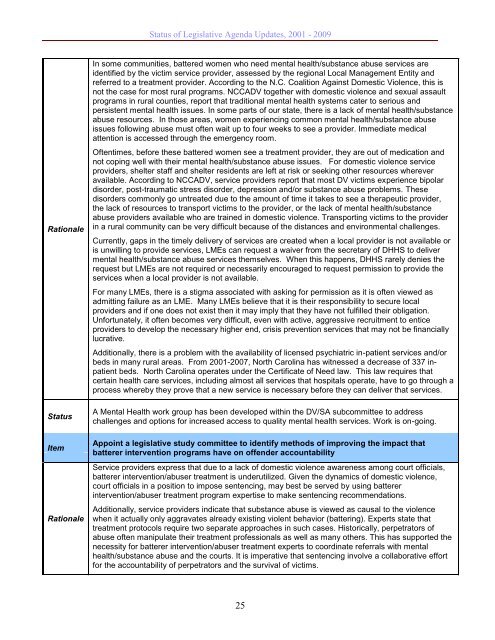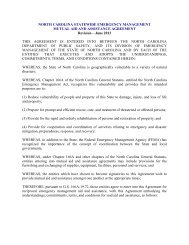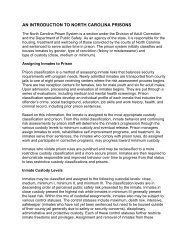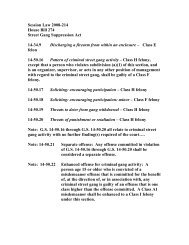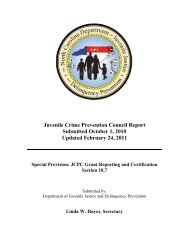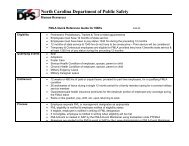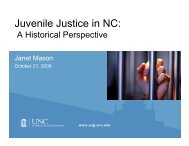GCC 2011 Legislative and Policy Agenda - North Carolina ...
GCC 2011 Legislative and Policy Agenda - North Carolina ...
GCC 2011 Legislative and Policy Agenda - North Carolina ...
- No tags were found...
You also want an ePaper? Increase the reach of your titles
YUMPU automatically turns print PDFs into web optimized ePapers that Google loves.
Status of <strong>Legislative</strong> <strong>Agenda</strong> Updates, 2001 - 2009RationaleStatusItemRationaleIn some communities, battered women who need mental health/substance abuse services areidentified by the victim service provider, assessed by the regional Local Management Entity <strong>and</strong>referred to a treatment provider. According to the N.C. Coalition Against Domestic Violence, this isnot the case for most rural programs. NCCADV together with domestic violence <strong>and</strong> sexual assaultprograms in rural counties, report that traditional mental health systems cater to serious <strong>and</strong>persistent mental health issues. In some parts of our state, there is a lack of mental health/substanceabuse resources. In those areas, women experiencing common mental health/substance abuseissues following abuse must often wait up to four weeks to see a provider. Immediate medicalattention is accessed through the emergency room.Oftentimes, before these battered women see a treatment provider, they are out of medication <strong>and</strong>not coping well with their mental health/substance abuse issues. For domestic violence serviceproviders, shelter staff <strong>and</strong> shelter residents are left at risk or seeking other resources whereveravailable. According to NCCADV, service providers report that most DV victims experience bipolardisorder, post-traumatic stress disorder, depression <strong>and</strong>/or substance abuse problems. Thesedisorders commonly go untreated due to the amount of time it takes to see a therapeutic provider,the lack of resources to transport victims to the provider, or the lack of mental health/substanceabuse providers available who are trained in domestic violence. Transporting victims to the providerin a rural community can be very difficult because of the distances <strong>and</strong> environmental challenges.Currently, gaps in the timely delivery of services are created when a local provider is not available oris unwilling to provide services, LMEs can request a waiver from the secretary of DHHS to delivermental health/substance abuse services themselves. When this happens, DHHS rarely denies therequest but LMEs are not required or necessarily encouraged to request permission to provide theservices when a local provider is not available.For many LMEs, there is a stigma associated with asking for permission as it is often viewed asadmitting failure as an LME. Many LMEs believe that it is their responsibility to secure localproviders <strong>and</strong> if one does not exist then it may imply that they have not fulfilled their obligation.Unfortunately, it often becomes very difficult, even with active, aggressive recruitment to enticeproviders to develop the necessary higher end, crisis prevention services that may not be financiallylucrative.Additionally, there is a problem with the availability of licensed psychiatric in-patient services <strong>and</strong>/orbeds in many rural areas. From 2001-2007, <strong>North</strong> <strong>Carolina</strong> has witnessed a decrease of 337 inpatientbeds. <strong>North</strong> <strong>Carolina</strong> operates under the Certificate of Need law. This law requires thatcertain health care services, including almost all services that hospitals operate, have to go through aprocess whereby they prove that a new service is necessary before they can deliver that services.A Mental Health work group has been developed within the DV/SA subcommittee to addresschallenges <strong>and</strong> options for increased access to quality mental health services. Work is on-going.Appoint a legislative study committee to identify methods of improving the impact thatbatterer intervention programs have on offender accountabilityService providers express that due to a lack of domestic violence awareness among court officials,batterer intervention/abuser treatment is underutilized. Given the dynamics of domestic violence,court officials in a position to impose sentencing, may best be served by using battererintervention/abuser treatment program expertise to make sentencing recommendations.Additionally, service providers indicate that substance abuse is viewed as causal to the violencewhen it actually only aggravates already existing violent behavior (battering). Experts state thattreatment protocols require two separate approaches in such cases. Historically, perpetrators ofabuse often manipulate their treatment professionals as well as many others. This has supported thenecessity for batterer intervention/abuser treatment experts to coordinate referrals with mentalhealth/substance abuse <strong>and</strong> the courts. It is imperative that sentencing involve a collaborative effortfor the accountability of perpetrators <strong>and</strong> the survival of victims.25


